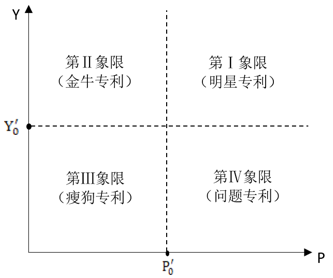 PDF(1268 KB)
PDF(1268 KB)


 PDF(1268 KB)
PDF(1268 KB)
 PDF(1268 KB)
PDF(1268 KB)
高校专利可转化性与转化金额影响因素对比研究及其对高校专利分级管理的启示
A Comparative Study on Influencing Factors between University Patent Transformation and Amount of Transformation and Its Implications for Patents Classification Management in Universities
[目的/意义] 对比研究高校专利可转化性与转化金额影响因素差异,是正确认识高校专利转化潜力、对专利进行转化前景进行预测和科学分级管理的前提,同时可以提升高校专利转化效率和精准度。[方法/过程] 以含有实际成交金额信息的高校转化专利样本和匹配的非转化样本为研究数据,基于同一套指标体系,分别采用多元线性回归和二元logistic回归模型对比研究高校专利可转化性与转化金额之间影响因素的差异。[结果/结论] 高校专利可转化性与转化金额的影响因素差异较大,仅文献页数、专利引证数影响关系一致,其余7个指标均不一致;体现专利法律稳定性的指标对高校专利可转化性具有更加显著的促进作用,而体现专利申请时人力、物力、财力投入的指标对提高高校专利转化金额的促进作用更强;从专利可转化性与转化金额预测值两个维度构建的专利四象限分级管理模型可以让高校专利分级管理工作更具针对性。
[Purpose/Significance] Comparing and studying the difference between the factors affecting university patent transformation and amount of transformation is the premise of correctly understanding the transformation potential of university patents, predicting the transformation prospects of patents, and conducting scientific classification management in universities, which can improve the efficiency and accuracy of university patent transformation. [Method/Process] Based on the same set of index system, multiple linear regression and binary logistical regression models are built to study the influencing factors between university patent transformation and amount of transformation, using transformation patent sample as research data, which contained actual transaction amount information. [Result/Conclusion] The influencing factors between university patent transformation and amount of transformation are quite different. Only the document pages and the number of patent citations have the same influence relationship, and the other seven indicators are inconsistent. The indicators reflecting the legal stability of the patent have a more significant role in promoting the transformation of university patents, while the indicators reflecting the input of man-power, material resources, financial resources have a stronger role in increasing the amount of patent transformation in universities. The four-quadrant classification management model constructed from the two dimensions of patent transformation probability and transformation amount forecast value make the patent classification management work in universities more targeted.

university patent transformation / amount of transformation / four-quadrant / classification management
| [1] |
国家知识产权局知识产权发展研究中心.2020年中国专利调查报告[EB/OL].[2022-10-24].https://www.cnipa.gov.cn/art/2021/4/28/art_88_158969.
|
| [2] |
吴红,马永新,董坤,等.高校专利分级管理实现的障碍及对策研究[J].图书情报工作,2016,60(2):59-63.
|
| [3] |
CHOI J H,JANG D S,JUN S H.A predictive model of technology transfer using patent analysis[J].Sustainability,2015,7(12):16175-16195.
|
| [4] |
ILYONG J, HYUNG J L, TAEYOUNG P. Exploring potential users of patents for technology transfer: Utilizing patent citation data[J]. Procedia computer science,2016,91(6):211-220.
|
| [5] |
陈静,张更平,慎金花.专利技术特征与高校专利转移间关系的实证研究——基于42所一流高校的样本分析[J].中国高校科技,2021(6):80-83.
|
| [6] |
李睿,范九江.高校专利可转化性与其文献计量特征相关性研究[J].科技进步与对策,2021,38(17):43-50.
|
| [7] |
吴红,李剑飞,崔哲,等.基于专利文献的高校专利可转移性特征研究[J].情报杂志,2021,40(9):187-194.
|
| [8] |
朱月仙,张娴,李姝影,等.国内外专利产业化潜力评价指标研究[J].图书情报工作,2015,59(1):127-133.
|
| [9] |
PARK H, REE J J, KIM K. Identification of promising patents for technology transfers using TRIZ evolution trends[J]. Expert systems with applications,2013,40(2):736-743.
|
| [10] |
韩盟,吴红,李昌,等.高校可转移专利识别研究——基于贝叶斯理论和组合赋权法[J].图书情报工作,2021,65(5):118-125.
|
| [11] |
肖国华,王江琦,魏剑.我国专利技术转移评价指标设计及应用研究[J].情报科学,2013,31(3):107-112.
|
| [12] |
冉从敬,宋凯.高校可转化性专利识别模型构建——以人工智能领域为例[J].情报理论与实践,2020,43(11):79-85.
|
| [13] |
FISCHER T, LEIDINGER J. Testing patent value indicators on directly observed patent value—an empirical analysis of ocean tomo patent auctions[J].Research policy,2014,43(3):519-529.
|
| [14] |
魏太琛,刘敏榕,陈振标.高校专利技术转移转化价值影响因素实证分析——基于11所一流高校专利转移转化数据[J].图书情报工作, 2022, 66(9):103-116.
|
| [15] |
李曦.专利技术转让合同中专利技术交易金额与专利要素之间的相关性研究[J].中国发明与专利,2021,18(5):38-45.
|
| [16] |
周雷.专利发明人对专利价值的影响研究——以中国科学院2018年3月专利拍卖为例[J].文献与数据学报,2020,2(4):70-83.
|
| [17] |
钱坤,张晓,黄忠全.交易情景下专利价值影响因素分析[J].科学学研究,2020,38(9):1608-1620.
|
| [18] |
SAPSALIS E, RAN N. Academic versus industry patenting: an in-depth analysis of what determines patent value[J]. Research policy,2006,35(10):1631-1645.
|
| [19] |
MARCO A C, SARNOFF J D, CHARLES A W. Patent claims and patent scope[J]. Research policy,2019,48(9):103790-103799.
|
| [20] |
施晴,王芸,徐宏,等.基于专利转化的高校生物医药专利质量评价研究[J].科技管理研究,2019,39(11):139-145.
|
| [21] |
孙玉涛,栾倩.专利质量测度“三阶段—两维度”模型及实证研究——以C9联盟高校为例[J].科学学与科学技术管理,2016,37(6):23-32.
|
| [22] |
李黎明,张敏,李小娟.引证网络专利质量对专利拍卖经济价值的影响效应研究[J].情报杂志,2021,40(10):115-121.
|
| [23] |
OG J Y A, PAWELEC K B, KIM B, et al. Measuring patent value indicators with patent renewal information(Article)[J].Journal of open innovation: technology, market, and complexity,2020,6(1):16-27.
|
| [24] |
张俊艳,赵薇,雷玲.合作创新能否提升专利质量?——基于PSM与回归分析的实证研究[J].天津大学学报(社会科学版),2020,22(3):246-253.
|
| [25] |
ZEEBROECK N, POTTELSBERGHE B, DOMINIQUE G. Claiming more: the increased voluminosity of patent applications and its determinants[J]. Research policy,2009,38(6):1006-1020.
|
| [26] |
IVAN D N,LUIGI O,FIORENZA B. The role of collaborative networks in supporting the innovation performances of lagging-behind European regions[J].Research policy,2018,47(1):1-13.
|
| [27] |
HIKKEROVA L, KAMMOUN N, LANTZ J S. Patent life cycle: new evidence[J].Technological forecasting and social change,2014,88(4): 313-324.
|
| [28] |
蔡中华,侯翱宇,马欢.专利维持时间影响因素的实证研究[J].科技管理研究,2015,35(21):160-163.
|
| [29] |
CREMERS K.Settlement during patent litigation trials-An empirical analysis for Germany[J]. Journal of technology transfer,2009,34(2):182-195.
|
| [30] |
CAVIGGIOLI F.Technology fusion: identification and analysis of the drivers of technology convergence using patent data[J].Technovation,2016,55(6):22-32.
|
魏太琛:提出研究思路,进行方案设计、数据分析,撰写论文;
刘敏榕:指导论文选题,提出论文修改建议;
陈振标:调研研究内容,设计研究框架。
/
| 〈 |
|
〉 |